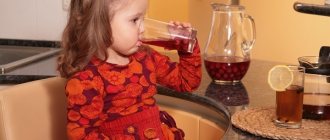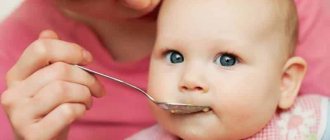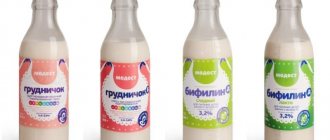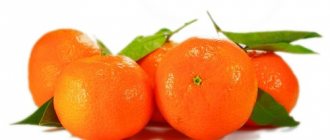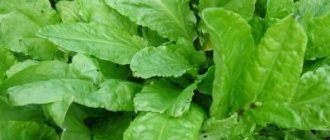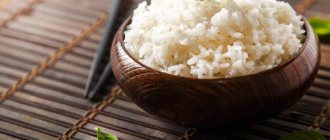Until 6 months, the baby does not need any other nutrition other than mother's milk. It replaces food and drink for him. But from six months of age, and in the case of artificial babies - even earlier, the mother inevitably faces the question: what can the child drink. Tea or cocoa - of course, cannot be given yet. Fermented milk drinks and juices, which are introduced into complementary foods quite early, are cold. I want to give my baby something warm, tasty and good for his health. And an old drink immediately comes to mind - compote. It is brewed from berries or fruits, so it retains a huge amount of substances that are most valuable for the child’s body. But in order for the drink to bring only benefits to the baby, you need to know at what age and what kind of compotes to offer the baby, and how to cook them correctly.
From what month should you give compote to a child?
You need to know that compote is considered as an additional liquid and, in fact, is not complementary food. However, you should not give it before the baby becomes familiar with fruit puree. So, for example, I gave my son applesauce at 7 months, and then, a week and a half later, I decided to cook apple compote. And my child’s body accepted it well.
If we are talking about children who are bottle-fed, they try fruit puree at 5-6 months. Then you can introduce this drink.
Reception features
Any new product must be introduced into the baby’s diet very carefully, the same goes for drinking. First you need to give the baby only a teaspoon of compote and wait a while. It is best to treat your child to this drink in the morning. If by the evening no negative symptoms appear, then you can use the same drink the next day.
Gradually the portion increases. However, you need to constantly monitor the baby’s reaction. If it starts to itch, the skin turns red, or the child is clearly unwell, there is no need to experiment any further. It's better to show it to a doctor.
Cooking rules
There are different ways to prepare compote. But there are a number of criteria that must always be observed:
- For compote, you must use special baby water purchased at a store or pharmacy. Water after a deep cleaning filter is also suitable.
- Take fruits and berries that are ripe, but not overripe, without dents or rotten areas.
- With red fruits, exotic fruits and citrus fruits, you should wait until a year.
- Cook the compote without adding sugar. And in the case of sour ingredients, you can add a little sugar, but honey or raisins are better.
- The first step is to prepare a drink from green apples. They are the most hypoallergenic fruits.
- To ensure a rich taste of the drink, the berries should be boiled whole, and the fruits should be cut into slices.
- Prepare the compote for 15 minutes after boiling, no longer.
- When the drink is ready, you need to put it in a dark place. Leave for an hour to steep thoroughly.
How to cook compote for babies?
Cooking compote for children is quite simple. The water must be of excellent quality, it is good if it is filtered. Fruits should be selected that are not overripe and without visible defects. You should not choose exotic foods; for a child of the first year of life, the most suitable food is considered to be the food that his ancestors consumed. Therefore, the first drink is best made from green apples; they are the least allergenic.
Useful: How to properly prepare and introduce meat puree into the diet for babies?
To get a tasty and healthy compote, the fruits are cut into slices and the berries are placed whole. In most cases, you need to cook for about fifteen minutes. Before use, it must be allowed to brew. Sugar should not be added to drinks. When you really want to sweeten it, you can do it with a small amount of fructose.
What kind of compote can a child
- The first and safest compote for a baby will be apple compote (from green varieties).
- Do not forget that the child needs a one-ingredient drink for the first time.
- You can gradually introduce compotes based on other fruits and berries, but you need to exclude red fruits and citrus fruits. You can start remembering them from the age of one.
- After adapting to a variety of fruits, you can experiment and mix different ingredients.
- It is important that the compote for the baby be without sugar or with a small amount, and only in the presence of sour fruits.
- For the little ones, this drink should be brewed no longer than a couple of minutes after boiling. This will help preserve the value of the product as much as possible.
- The finished compote should brew and saturate the taste.
- The baby should be given a fresh drink, recently prepared. When it goes into the refrigerator, it loses its properties.
- For toddlers, you need to strain the compote, getting rid of fruits and berries.
- Try to use fresh and whole (without dents or rotten areas) ingredients, or dried fruits. Although in winter it is allowed to prepare compote from frozen fruits and berries.
- It is necessary to adhere to age norms when drinking the drink.
- It is better if the baby drinks compote in the morning or at lunch.
- This drink is not complementary food, so it can be drunk both after feeding and during feeding. The main thing is that it is not cold or too warm.
Compotes and fruit drinks
Cranberry.
The red berry contains a rather rare vitamin PP, which promotes the absorption of ascorbic acid, and therefore cranberries have almost no equal as a means of boosting immunity. Just keep in mind: vitamin C is destroyed during boiling, so it’s better not to boil fruit juice. The drink will be much healthier if you squeeze the juice out of the berries, and boil the pulp (skin and remaining pulp) with sugar and strain again. Then mix everything and cool.
Peach.
Peaches are good for active children - they restore strength, strengthen the heart and improve vision. Compote is prepared from 500 g of fruit and 3/4 cup of sugar. But before cooking, the peaches must be peeled - keep them in boiling water for 2-3 minutes, then remove the skin, cut in half and remove the seeds.
Strawberry.
Unfortunately, garden strawberry compote is a forbidden fruit for children with allergies, but for everyone else, the berry is very useful - the delicacy gives the body antioxidants, pectins and a whole range of necessary micro- and macroelements. The strawberry drink turns out beautiful and appetizing, the main thing is to choose unripe fruits.
Crimson.
Raspberry compote contains salicylic acid, so it will be a good natural antipyretic for your baby. However, before preparing such a drink, dip the berries in warm salty water - this way you will rid them of insects and larvae.
Currant.
In all compotes, ascorbic acid is destroyed, but in blackcurrant it is not: the berries contain a lot of tannins, which help vitamin C to be preserved even after processing. Compotes made in equal proportions from black, white and red currants look best.
How much can you give?
When you first give your baby compote, you should remember that the portion should not exceed 5 ml. After assessing the body’s reaction to the drink, if everything is fine, you can continue to increase the dose. A seven-month-old baby can drink a maximum of 100 ml per day. The main thing to remember is that he drinks this amount per day, and not at one time. I gave it three times a day - 30, 40 and 30 ml.
At one year old, a child can drink 250 ml of liquid per day, including compote. And what percentage will belong to him, and what to water, is up to you and your child to decide. If your baby prefers compote, cook it without adding sugar, otherwise you risk that the glucose in the child’s blood will start to go off scale.
Expert opinion
Alexey Dobrovolsky, nutritionist, member of the Society of Aesthetic Medicine Specialists
Compote can be given to children from one year of age, just dilute it with water and make it not very sweet. For 1-1.5 year old children, the norm is 1/2 cup per day, for 10-14 year olds – 2-3 glasses. It is better to offer a sweet drink to your child at the end of lunch or dinner so that it does not interrupt his appetite. And make sure your baby is not allergic to any fruits or berries. Green apples and pears are considered the safest, followed by apricots, yellow cherries and dark red cherries. Strawberries, wild strawberries and other brightly colored fruits are especially allergenic.
Recipes
I give you three easy recipes that will be beneficial for the health of your little one:
Recipe 1.
You will need two, preferably green, apples.
- Wash the fruit thoroughly, peel and remove the core.
- Cut the apples into cubes or just slices.
- Place them in a saucepan, fill with water (2 cups), and put on fire.
- After boiling, cook for 15 minutes, no more.
- At the end of cooking, you can add a little honey or raisins. They are a great substitute for sugar.
Recipe 2.
You will need black currants (300 grams).
- Wash the berries thoroughly, remove leaves and twigs.
- Pour the currants into the pan.
- Fill the berries with water (half a liter).
- Bring to a boil, cook for 15 minutes.
- The finished compote must be strained to separate the berries from the liquid.
Recipe 3.
This compote will be prepared using dried fruits.
- Soak 200 grams of dried fruits in warm water and leave to infuse overnight. It is important to cover them with a lid.
- Bring the finished infusion to boiling temperature and cook for 15 minutes.
- Leave the compote in a dark place for one hour.
- Strain the liquid from the fruit.
So we got acquainted with how to start drinking compote for children. It is a useful product. Don't be discouraged if your baby increasingly asks for this drink rather than water. Don’t forget not to add sugar when cooking, and if you can’t do without it, it’s better to use honey or raisins.
Dried fruit compote for babies
At the end of winter, apples lose their beneficial properties, so it is better to cook dried fruit compote for babies. The best ones are those that were dried not in the oven, but in the sun. When choosing a product, you should pay attention to the appearance: the fruits are bright and free of defects, probably treated with a special composition. Before cooking, wash them well and soak them in water for a while. For a handful of dried fruits you need about a glass of liquid. They are poured into already boiling water, and after fifteen minutes they are removed from the stove. Dried apples are suitable for the first time, then you can add dried apricots, raisins, and prunes. Raisins will add a little sweetness to the drink; add them five minutes before the end of cooking. Strain before use.
Useful: The best recipes for complementary feeding at 9 months
You can make a drink from dried apricots and raisins without cooking: just pour boiling water over them in the evening, cover with a lid and leave overnight.
At what age can children be given dried fruits?
Dried fruits themselves are a complex food for a child. But compotes based on them are an excellent option for infants and children under one year old.
According to the recommendation of the authoritative World Health Organization, complementary feeding should begin to be given to an infant at six months. By this time, the baby’s gastrointestinal tract has already become a little stronger and is ready to accept other foods (not mother’s milk or adapted milk formula).
Complementary feeding is necessarily accompanied by abundant supplementation. In modern pediatrics it is believed that it is not necessary to give a child anything to drink until he is 6 months old. The exception is situations with elevated body temperature of the baby, prolonged diarrhea.
In this case, the child can be given purified water and weak decoctions of medicinal herbs.
Compotes should appear in the baby’s diet at 6 months. Complementary feeding is often accompanied in children, since the intestines do not immediately adapt to new food. For this reason, dried fruit compote for babies helps solve this problem.
Suitable age for introduction into the diet
Most pediatricians are inclined to believe that this vitamin drink can be given to a child at 6 months. Before this age, compotes are not recommended due to possible allergies. Ideally, before preparing the drink, you should try to offer your baby the berries and fruits that are included in the composition. If a rash, flatulence or difficulty breathing does not appear after a while, then the child does not have an allergy.
The optimal age when you can give compote is considered to be from 3 to 12 months. However, before starting such complementary feeding, it would be advisable to consult a pediatrician. Young mothers should follow these rules when introducing the product:
- At 6 months of age, you can brew fruit and berry drinks.
- When your baby turns one year old, offer him dried fruit compote. The drink is especially relevant in winter, when it is impossible to find fresh fruits on store shelves that will delight you with their vitamin composition. Drinks from dried fruits can be prepared without sugar, because the ingredients themselves are sweet.
- First, compotes for a child are diluted with boiled water so as not to provoke allergies again.
If you still decide to give your baby a fruit drink from 5 months, then first check for an allergic reaction to the ingredients and consult with your pediatrician. Taking into account the rich vitamin composition, infants should drink compotes immediately after feeding.
What are the benefits of dried fruits?
High-quality dried fruits retain more nutrients than frozen berries, ready-made compotes or jam. In addition, they are not processed with sugar, so they do not harm the child’s body due to extra calories.
Eating them in winter is the best way to combat vitamin deficiency.
Dried fruit drink:
- strengthens the immune system
- improves appetite
- good for arthritis (if the recipe includes apricots)
- reduces and stabilizes intracranial pressure
- increases hemoglobin levels (if the recipe includes prunes)
- has a bactericidal effect (used in the treatment of genitourinary tract infections)
- normalizes metabolism
- strengthens the nervous system, helps treat depression
If the recipe contains several ingredients, this is not a good option for babies. Children over 12 months can already be offered multi-ingredient drinks.
It is necessary to limit the consumption of compotes or reduce them to a minimum if a child has a stomach ulcer.
Most berries have a diuretic effect, so drinks based on them can increase the load on the kidneys. Compotes must be offered to children of any age in strictly dosed doses so as not to have the opposite health effect.
A child's stool upset should be the reason to refuse compotes, especially those containing prunes and dried apricots.
